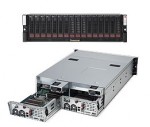One of the amusing aspects of being self-employed is watching all the giants battle it out. Every company is gunning for someone, but the amazing thing is that they rarely have each other in their sights: NetApp is gunning for EMC who’s more focused on HP who wants to knock off Oracle who’s fixated on IBM. It sounds very “high school romance” but this is deadly-serious business.
Computer History
Considering the history of computing, from the enterprise to the home.
What If Light Peak Was Electrical Rather Than Optical?
As I considered the possibilities of the new Apple/Intel interconnect technology known as Light Peak, an odd parallel with 10 Gb Ethernet popped into my head. Much of the confusion around Light Peak revolves around connectors, power conduction, and backward-compatibility. Then, like the Grinch, I thought of something I hadn’t before: Why use optical at all? 10 GBASE-T does just fine over twisted pair, and short interconnect distances would reduce power draw to reasonable levels. What if Light Peak was electrical rather than optical?
Eleven Tech Trends To Watch In 2011
Prognostication is a perilous business, but pundits are drawn to the topic in the month of December. The fact that most predictions fall on their faces demonstrates the intoxicating mix of hope, dreams, and irrationality that mark both geniuses and fools. I am neither, so I like to make predictions after the fact! But this year I’ve been asked to look to the future, so I’ll stick with the safe road and pick current trends rather than guessing what I hope will come.
4G: Is It Really A Standard If No One Cares?
Americans have terrible mobile broadband network infrastructure, yet our service providers make it sound awesome. Now that 2 of our 4 national wireless providers now offer 4G service, one might conclude that the United States is awash in mobile broadband. But neither of these supposed 4G offerings is anywhere near fast enough to meet the ITU standards for 4G, and even our 3G networks woefully under-perform vendor promises. With no teeth in “truth-in-advertising” laws, it begs the question of what these supposed standards really mean.
Commodity Hardware Always Wins
The history of technology moves in fits and starts, but one trend trumps all else: An inevitable shift from fine-tuned specialized gear to general-purpose commodity building blocks. We see it in both hardware and software, and at all levels of the industry, from chips and wafers to operating systems and networking devices. Take a step back and you’ll certainly agree: Commodity hardware always wins (eventually).




